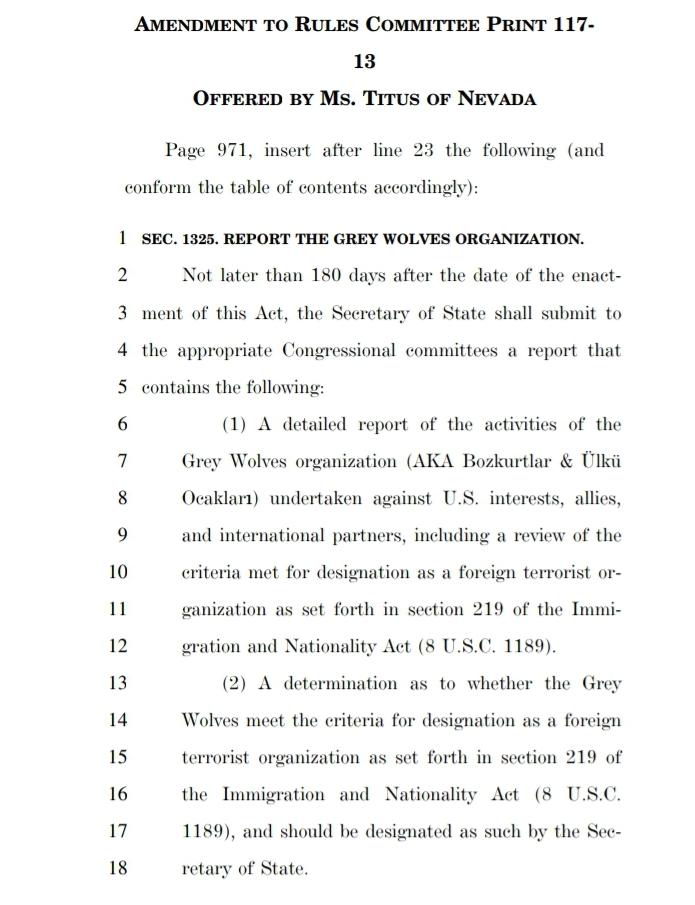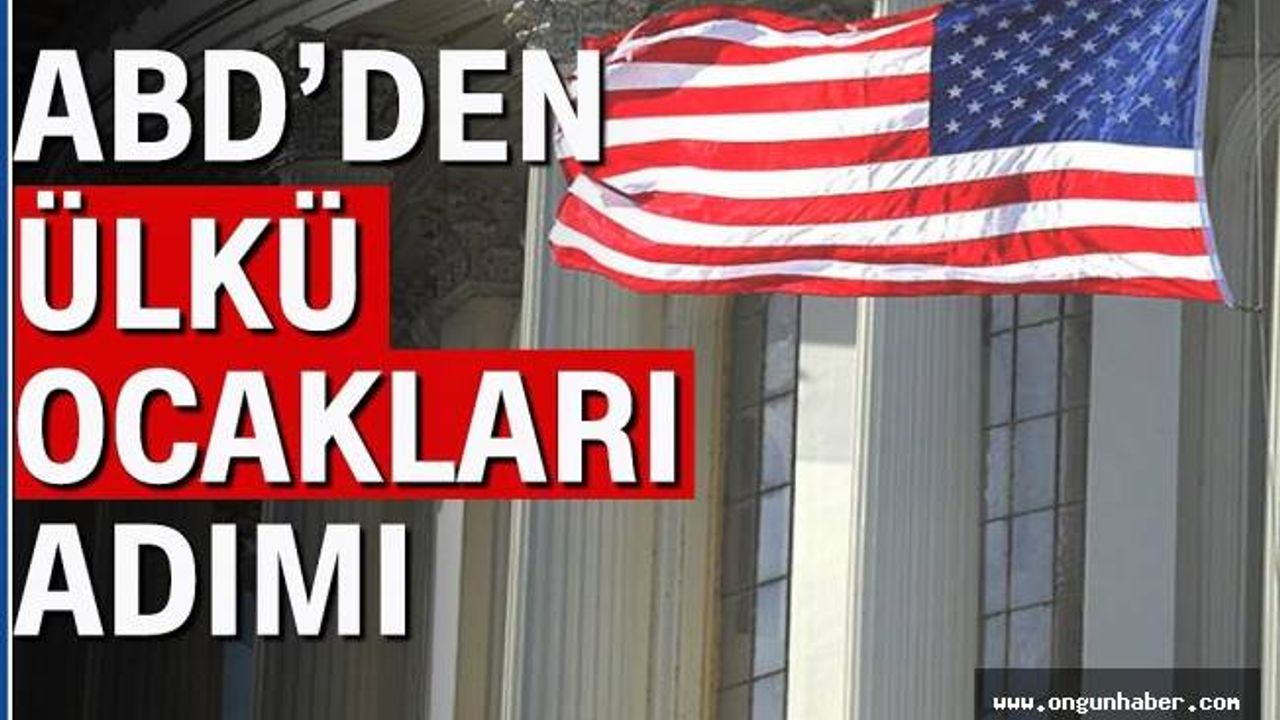Hollanda, Almanya, Fransa ve Avusturya'dan sonra, Ülkü Ocaklarıyla ilgili son hamle ABD'den geldi. 579 sayılı ABD Savunma Bakanlığı bütçesine eklenmesi talebi ile sunulan ek önergede,Demokrat Parti Nevada Senatörü Dina Titus, Ülkü Ocaklarının "terörist örgüt" olup olmadığı hakkında ABD Dışişleri Bakanlığından rapor talep etti. Eğer ABD Dışişleri Bakanlığı, Ülkü Ocaklarının terörist örgüt olmadığını belirtirse, Senatör Titus, bu açıklamanın da ayrıntılı şekilde sunulmasını talep etti.
Demokrat Nevada Vekili Dina Titus tarafından 2022 Savunma Bütçe tasarısına (NDAA) eklenen bir madde, Dışişleri Bakanlığının "Ülkü Ocaklarının yabancı bir terör örgütü olma kriterlerini karşılayıp karşılamadığının" araştırılmasının öngörüyor.
İlgili Rapor talebinde ayrıca; Ülkü Ocakları olarak da bilinen Bozkurtların detaylı faaliyetleri; Yabancı terör örgütü kriterlerini karşılıyorlar mı bunu belirleyecek bir değerlendirme ve sonuç olarak yabancı terör örgütü olmadıkları kanaatine varılırsa da hangi kriterleri karşılamamış olduklarını da izah eden detaylı bir açıklama" isteniyor.
24 Eylül 2021 Cuma günü Temsilciler Meclisi Kurallar Komitesince kabul edilerek NDAA metnine eklenen madde, tasarının yasalaşmasının ardından 180 gün içinde Dışişleri Bakanlığının konuya ilişkin bir rapor hazırlayarak Kongre'ye sunmasını talep ediyor. Bakanlığın raporunda, Ülkü Ocaklarının yabancı terör örgütü kriterlerini neden karşıladığı ya da karşılamadığını değerlendirmesi de bekleniyor.
Söz konusu maddenin bağlayıcı olabilmesi için savunma bütçe yasa tasarısının Senato'da da aynı şekilde kabul edilmesi ve Başkan Joe Biden tarafından imzalanarak yasalaşması gerekiyor.

(ENGLISH NEWS)
US Representative Dina Titus, a Democrat from Nevada, has proposed an amendment to the Fiscal Year 2022 National Defense Authorization Act (NDAA) filed this week calling for the designation of Turkish far-right nationalist group the Grey Wolves as a terrorist group.
The amendment requires a report by the US Secretary of State on the activities of the Grey Wolves organization “undertaken against US interests, allies and international partners,” including a review of the criteria met for designation as a “foreign terrorist organization.”
The amendment calls for a determination as to whether the group, the militant wing of Turkey’s far-right Nationalist Movement Party, meets the criteria as set forth in section 219 of the Immigration and Nationality Act. If the Secretary of State determines that the Grey Wolves do not meet those criteria, the amendment calls for “a detailed justification as to which criteria have not been met.”
In November, the French government banned the ultranationalist group after accusing it of leading violent actions and inciting hatred speech in the country.
Foreign Terrorist Organizations (FTOs) are foreign organizations that are designated by the Secretary of State in accordance with section 219 of the Immigration and Nationality Act (INA), as amended. FTO designations play a critical role in our fight against terrorism and are an effective means of curtailing support for terrorist activities and pressuring groups to get out of the terrorism business.
ATTENTION PLS DEAR DINA TITUS - Designated Foreign Terrorist Organizations https://www.state.gov/foreign-terrorist-organizations/
Date Designated
Name
10/8/1997
Abu Sayyaf Group (ASG)
10/8/1997
Aum Shinrikyo (AUM)
10/8/1997
Basque Fatherland and Liberty (ETA)
10/8/1997
Gama’a al-Islamiyya (Islamic Group – IG)
10/8/1997
HAMAS
10/8/1997
Harakat ul-Mujahidin (HUM)
10/8/1997
Hizballah
10/8/1997
Kahane Chai (Kach)
10/8/1997
Kurdistan Workers Party (PKK, aka Kongra-Gel)
10/8/1997
Liberation Tigers of Tamil Eelam (LTTE)
10/8/1997
National Liberation Army (ELN)
10/8/1997
Palestine Liberation Front (PLF)
10/8/1997
Palestine Islamic Jihad (PIJ)
10/8/1997
Popular Front for the Liberation of Palestine (PFLP)
10/8/1997
PFLP-General Command (PFLP-GC)
10/8/1997
Revolutionary Armed Forces of Colombia (FARC)
10/8/1997
Revolutionary People’s Liberation Party/Front (DHKP/C)
10/8/1997
Shining Path (SL)
10/8/1999
al-Qa’ida (AQ)
9/25/2000
Islamic Movement of Uzbekistan (IMU)
5/16/2001
Real Irish Republican Army (RIRA)
12/26/2001
Jaish-e-Mohammed (JEM)
12/26/2001
Lashkar-e Tayyiba (LeT)
3/27/2002
Al-Aqsa Martyrs Brigade (AAMB)
3/27/2002
Asbat al-Ansar (AAA)
3/27/2002
al-Qaida in the Islamic Maghreb (AQIM)
8/9/2002
Communist Party of the Philippines/New People’s Army (CPP/NPA)
10/23/2002
Jemaah Islamiya (JI)
1/30/2003
Lashkar i Jhangvi (LJ)
3/22/2004
Ansar al-Islam (AAI)
7/13/2004
Continuity Irish Republican Army (CIRA)
12/17/2004
Islamic State of Iraq and the Levant (formerly al-Qa’ida in Iraq)
6/17/2005
Islamic Jihad Union (IJU)
3/5/2008
Harakat ul-Jihad-i-Islami/Bangladesh (HUJI-B)
3/18/2008
al-Shabaab
5/18/2009
Revolutionary Struggle (RS)
7/2/2009
Kata’ib Hizballah (KH)
1/19/2010
al-Qa’ida in the Arabian Peninsula (AQAP)
8/6/2010
Harakat ul-Jihad-i-Islami (HUJI)
9/1/2010
Tehrik-e Taliban Pakistan (TTP)
11/4/2010
Jaysh al-Adl (formerly Jundallah)
5/23/2011
Army of Islam (AOI)
9/19/2011
Indian Mujahedeen (IM)
3/13/2012
Jemaah Anshorut Tauhid (JAT)
5/30/2012
Abdallah Azzam Brigades (AAB)
9/19/2012
Haqqani Network (HQN)
3/22/2013
Ansar al-Dine (AAD)
11/14/2013
Boko Haram
11/14/2013
Ansaru
12/19/2013
al-Mulathamun Battalion (AMB)
1/13/2014
Ansar al-Shari’a in Benghazi
1/13/2014
Ansar al-Shari’a in Darnah
1/13/2014
Ansar al-Shari’a in Tunisia
4/10/2014
ISIL Sinai Province (formerly Ansar Bayt al-Maqdis)
5/15/2014
al-Nusrah Front
8/20/2014
Mujahidin Shura Council in the Environs of Jerusalem (MSC)
9/30/2015
Jaysh Rijal al-Tariq al Naqshabandi (JRTN)
1/14/2016
ISIL-Khorasan (ISIL-K)
5/20/2016
Islamic State of Iraq and the Levant’s Branch in Libya (ISIL-Libya)
7/1/2016
Al-Qa’ida in the Indian Subcontinent
8/17/2017
Hizbul Mujahideen (HM)
2/28/2018
ISIS-Bangladesh
2/28/2018
ISIS-Philippines
2/28/2018
ISIS-West Africa
5/23/2018
ISIS-Greater Sahara
7/11/2018
al-Ashtar Brigades (AAB)
9/6/2018
Jama’at Nusrat al-Islam wal-Muslimin (JNIM)
4/15/2019
Islamic Revolutionary Guard Corps (IRGC)
1/10/2020
Asa’ib Ahl al-Haq (AAH)
1/14/2021
Harakat Sawa’d Misr (HASM)
3/11/2021
ISIS-DRC
3/11/2021
ISIS-Mozambique
Delisted Foreign Terrorist Organizations
Date Removed
Name
Date Originally Designated
10/8/1999
Democratic Front for the Liberation of Palestine -Hawatmeh Faction
10/8/1997
10/8/1999
Khmer Rouge
10/8/1997
10/8/1999
Manuel Rodriguez Patriotic Front Dissidents
10/8/1997
10/8/2001
Japanese Red Army
10/8/1997
10/8/2001
Tupac Amaru Revolution Movement
10/8/1997
5/18/2009
Revolutionary Nuclei
10/8/1997
10/15/2010
Armed Islamic Group (GIA)
10/8/1997
9/28/2012
Mujahedin-e Khalq Organization (MEK)
10/8/1997
5/28/2013
Moroccan Islamic Combatant Group (GICM)
10/11/2005
7/15/2014
United Self Defense Forces of Colombia
9/10/2001
9/3/2015
Revolutionary Organization 17 November (17N)
10/8/1997
12/9/2015
Libyan Islamic Fighting Group (LIFG)
12/17/2004
6/1/2017
Abu Nidal Organization (ANO)
10/8/1997
2/16/2021
Ansarallah
1/19/2021
Identification
The Bureau of Counterterrorism in the State Department (CT) continually monitors the activities of terrorist groups active around the world to identify potential targets for designation. When reviewing potential targets, CT looks not only at the actual terrorist attacks that a group has carried out, but also at whether the group has engaged in planning and preparations for possible future acts of terrorism or retains the capability and intent to carry out such acts.
Designation
Once a target is identified, CT prepares a detailed “administrative record,” which is a compilation of information, typically including both classified and open sources information, demonstrating that the statutory criteria for designation have been satisfied. If the Secretary of State, in consultation with the Attorney General and the Secretary of the Treasury, decides to make the designation, Congress is notified of the Secretary’s intent to designate the organization and given seven days to review the designation, as the INA requires. Upon the expiration of the seven-day waiting period and in the absence of Congressional action to block the designation, notice of the designation is published in the Federal Register, at which point the designation takes effect. By law an organization designated as an FTO may seek judicial review of the designation in the United States Court of Appeals for the District of Columbia Circuit not later than 30 days after the designation is published in the Federal Register.
Until recently the INA provided that FTOs must be redesignated every 2 years or the designation would lapse. Under the Intelligence Reform and Terrorism Prevention Act of 2004 (IRTPA), however, the redesignation requirement was replaced by certain review and revocation procedures. IRTPA provides that an FTO may file a petition for revocation 2 years after its designation date (or in the case of redesignated FTOs, its most recent redesignation date) or 2 years after the determination date on its most recent petition for revocation. In order to provide a basis for revocation, the petitioning FTO must provide evidence that the circumstances forming the basis for the designation are sufficiently different as to warrant revocation. If no such review has been conducted during a 5 year period with respect to a designation, then the Secretary of State is required to review the designation to determine whether revocation would be appropriate. In addition, the Secretary of State may at any time revoke a designation upon a finding that the circumstances forming the basis for the designation have changed in such a manner as to warrant revocation, or that the national security of the United States warrants a revocation. The same procedural requirements apply to revocations made by the Secretary of State as apply to designations. A designation may be revoked by an Act of Congress, or set aside by a Court order.
Legal Criteria for Designation under Section 219 of the INA as amended
- It must be a foreign organization.
- The organization must engage in terrorist activity, as defined in section 212 (a)(3)(B) of the INA (8 U.S.C. § 1182(a)(3)(B)),or terrorism, as defined in section 140(d)(2) of the Foreign Relations Authorization Act, Fiscal Years 1988 and 1989 (22 U.S.C. § 2656f(d)(2)), or retain the capability and intent to engage in terrorist activity or terrorism.
- The organization’s terrorist activity or terrorism must threaten the security of U.S. nationals or the national security (national defense, foreign relations, or the economic interests) of the United States.
Legal Ramifications of Designation
- It is unlawful for a person in the United States or subject to the jurisdiction of the United States to knowingly provide “material support or resources” to a designated FTO. (The term “material support or resources” is defined in 18 U.S.C. § 2339A(b)(1) as ” any property, tangible or intangible, or service, including currency or monetary instruments or financial securities, financial services, lodging, training, expert advice or assistance, safehouses, false documentation or identification, communications equipment, facilities, weapons, lethal substances, explosives, personnel (1 or more individuals who maybe or include oneself), and transportation, except medicine or religious materials.” 18 U.S.C. § 2339A(b)(2) provides that for these purposes “the term ‘training’ means instruction or teaching designed to impart a specific skill, as opposed to general knowledge.” 18 U.S.C. § 2339A(b)(3) further provides that for these purposes the term ‘expert advice or assistance’ means advice or assistance derived from scientific, technical or other specialized knowledge.’’
- Representatives and members of a designated FTO, if they are aliens, are inadmissible to and, in certain circumstances, removable from the United States (see 8 U.S.C. §§ 1182 (a)(3)(B)(i)(IV)-(V), 1227 (a)(1)(A)).
- Any U.S. financial institution that becomes aware that it has possession of or control over funds in which a designated FTO or its agent has an interest must retain possession of or control over the funds and report the funds to the Office of Foreign Assets Control of the U.S. Department of the Treasury.
Other Effects of Designation
- Supports our efforts to curb terrorism financing and to encourage other nations to do the same.
- Stigmatizes and isolates designated terrorist organizations internationally.
- Deters donations or contributions to and economic transactions with named organizations.
- Heightens public awareness and knowledge of terrorist organizations.
- Signals to other governments our concern about named organizations.
Revocations of Foreign Terrorist Organizations
The Immigration and Nationality Act sets out three possible basis for revoking a Foreign Terrorist Organization designation:
- The Secretary of State must revoke a designation if the Secretary finds that the circumstances that were the basis of the designation have changed in such a manner as to warrant a revocation;
- The Secretary of State must revoke a designation if the Secretary finds that the national security of the United States warrants a revocation;
- The Secretary of State may revoke a designation at any time.
Any revocation shall take effect on the date specified in the revocation or upon publication in the Federal Register if no effective date is specified. The revocation of a designation shall not affect any action or proceeding based on conduct committed prior to the effective date of such revocation.









